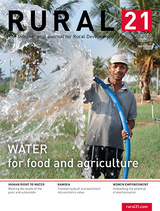Externe Publikationen

Public-private partnerships in irrigation: how can smallholders benefit?
Houdret, Annabelle / Michael Brüntrup / Waltina ScheumannExterne Publikationen (2020)
in: Rural 21 54 (1)
Although the positive effects of irrigation on food security and poverty alleviation are well-documented, public investments in this area have been on the decline since the 1990s. Comparing irrigation schemes in Zambia and Morocco, our authors have examined whether private sector investments are suitable to fill this gap and what preconditions have to be met to ensure that PPPs offer advantages for small-scale farmers.
The benefits of irrigation are undisputed. It can help to improve and stabilise agricultural productivity, thereby contributing to food security and to resilience against climate change. Irrigation – either full or supplementary – reduces reliance on erratic rainfall, improves drought resilience and increases yields; it extends cropping periods and cycles, allows the cultivation of a broader spectrum of crops and provides stable conditions for applying further yield-increasing means (fertilisers). Irrigation also encourages farmers to invest, on the one hand, and financial institutions to provide credits, on the other. Moreover, as evidence from Asia shows, irrigation has the potential to reduce poverty rates and income inequalities. But mobilising investments is key to taking advantage of this potential, which can be a problem, especially in sub-Saharan Africa.
Kontakt
Cornelia Hornschild
Koordinatorin Publikationen
E-Mail Cornelia.Hornschild@idos-research.de
Telefon +49 (0)228 94927-135
Fax +49 (0)228 94927-130
Alexandra Fante
Bibliothekarin/Open Access-Koordinatorin
E-Mail Alexandra.Fante@idos-research.de
Telefon +49 (0)228 94927-321
Fax +49 (0)228 94927-130





